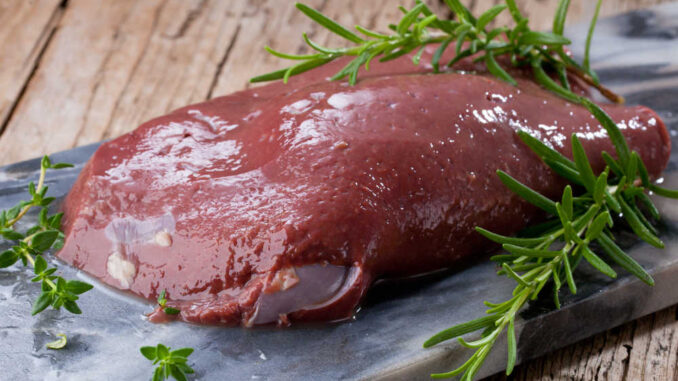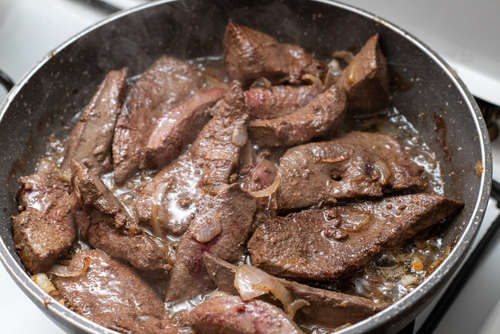
As a practicing vet, I have owners approach me almost daily to discuss their dog’s diet and what options are best. For the last decade or two, there has been a real trend to feed more ‘natural’ and to even raw feed our pets. Feeding offal including liver and tripe is very common, particularly in those who follow a BARF (Bones And Raw Food) diet. In this article, we will discuss beef liver.
Can dogs safely eat beef liver?
Yes, dogs can safely eat beef liver, and it can be a beneficial addition to their diet. However, it is critical that you keep the following in mind:
- Offer your dog only small quantities: Like with any food, moderation is key. While beef liver offers various essential nutrients, eating too much beef liver can lead to potential health risks, particularly due to vitamin A toxicity. This is thought to be uncommon however, and there is more of a concern for Vitamin A deficiency in those who are raw fed (1).
- Avoid RAW beef liver: Caution is advised when feeding raw beef liver. As with other raw meats and organs, raw liver may contain harmful bacteria such as E. coli or Salmonella, which can lead to food poisoning and other health issues in dogs. Most vets would advise you cook beef liver thoroughly before offering it to your dog (2).
- Ask your veterinarian before starting a diet rich in liver, or before changing your dog’s diet to a homemade or raw diet. As many homemade diets are nutrient deficient (3), owners are advised to consult with a canine nutritionist before swapping over from a commercial diet.
- Liver is not advised for those who have too much Vitamin A or who are on certain medications. Pregnant dogs should not be given too much Vitamin A, particularly in the first half of their pregnancy.
- Try a small amount first: if your dog has not had beef liver before, offer a small amount initially and watch them over the next 24 hours for any signs such as an upset stomach or bloating, in case they may find this organ meat hard to digest. If all goes well, we can slowly offer a little more each time.
Is beef liver high in fat?
Beef liver is relatively low in fat, though it is high in cholesterol. How the cows have been fed (e.g. on pasture or corn) can influence the fat content. Liver is a nutrient-dense organ meat that provides essential vitamins and minerals.
Dogs need fat to provide energy but also to regulate their temperature and help in hormone production. Some dogs need to restrict their fat intake (for example, those who have had pancreatitis in the past), but even these dogs should be able to eat beef liver in moderation.
How much beef liver is safe for dogs to eat?
The amount of beef liver that is safe for dogs to eat depends on their size, age, and overall health. Generally, beef liver should only make up a small percentage of a dog’s total diet, usually no more than 5-10% of their daily caloric intake.
You can talk to your veterinarian to determine the appropriate serving size for your specific dog. Your vet will consider factors such as your dog’s weight, breed, activity level, and any underlying health conditions to provide personalized advice on the amount of beef liver that can be safely incorporated into their diet.
How should I prepare beef liver for my dog?
When preparing beef liver for your dog, it’s advised you cook it thoroughly before offering it to them. Raw liver may contain harmful bacteria that can cause food poisoning in dogs, and this can even be passed on to the humans in the home.
Here are simple and safe ways to cook beef liver for your furry friend:
1. Boiling in water
Follow these simple steps:
- Boil water and carefully add the beef liver. The liver should not be rinsed first, as this can spread bacteria around the home.
- Reduce the heat and let the liver simmer until it is fully cooked. The internal temperature of the liver should reach 160°F (71°C). This will take from 10-20 minutes, depending on how large the chunks are.
- Once cooked, remove the liver from the water and let it cool.
- Do not be tempted to season it with e.g. spices or salt.
- Cut the liver into small, bite-sized pieces, suitable for your dog’s size and breed.
Another option is to pan fry the beef liver in a little olive oil. Let’s have a look!
2. Pan-Fry: This method is quicker and your dog will find the aromas spreading around the home hard to resist. For a medium sized portion, fry on each side for 3-5 minutes until golden brown.
Beware of recipes that advise adding sautéed onions or garlic, as these are both toxic to dogs (4).

You can offer the cooked beef liver as an occasional treat or mix it with your dog’s regular food for added nutritional benefits.
What nutrients in beef liver are good for dogs?
Beef liver is a nutrient powerhouse and offers various essential nutrients that are highly beneficial for dogs’ health. Some of the key nutrients found in beef liver and their benefits include:
- Protein. Protein is needed for maintaining and building muscle mass and is important at all stages of a dog’s life. While there is some misinformation out there that we need to feed senior dogs on restricted protein diets, the truth is they simple need good quality protein that is highly digestible, to prevent muscle wasting. Liver is a great option for these golden oldies. The AAFCO advises a minimum of 51gm/1000kcal for both adult and senior dogs.
- Vitamin A: Essential for good vision, immune function, and skin health.
- B vitamins (B1, B2, B6, B9, B12): Support metabolism, energy production, and nervous system function.
- Iron: Aids in the formation of hemoglobin, which carries oxygen in the blood.
- Zinc: Helps maintain a healthy immune system and supports wound healing.
- Copper: Contributes to enzyme function, collagen formation, and iron metabolism.
These nutrients are crucial for various bodily functions, and incorporating beef liver into your dog’s diet can help ensure they receive a well-rounded intake of essential vitamins and minerals.
Do keep in mind though, a balanced commercial diet will contain everything your dog needs and we should not have to supplement it.
Conclusion
Beef liver can be a nutritious and tasty addition to your dog’s diet when fed in moderation (it should account for less than 5-10% of your dog’s daily caloric intake). The various essential nutrients it contains can support your dog’s overall health and well-being. However, it’s essential to be mindful of portion sizes and consult your veterinarian before introducing beef liver into your dog’s diet, especially if they have any underlying health conditions.
- https://www.cambridge.org/core/journals/british-journal-of-nutrition/article/intake-of-minerals-trace-elements-and-vitamins-in-bone-and-raw-food-rations-in-adult-dogs/7520574DA173F4DB29330A6F858DE0E0
- https://www.bsava.com/petsavers/our-impact/published-outputs/raw-meat-diets/
- https://www.tuftsyourdog.com/dogfoodandnutrition/a-homemade-dog-food-diet-or-store-bought/
- https://www.pdsa.org.uk/pet-help-and-advice/pet-health-hub/conditions/onion-and-garlic-poisoning-in-dogs
Disclaimer: This website's content is not a substitute for veterinary care. Always consult with your veterinarian for healthcare decisions. Read More.


just wondering, do dogs really need to eat vegetables?
Hi Jeanine and thank you for your query. Really, the only thing a dog needs is a complete dog food. Any diet marketed as ‘complete’ and balanced will contain all of the nutrients your dog needs, provided you are offering them the right life stage food (i.e. puppy food for a puppy, senior food for a senior). We do not need to supplement anything. However, owners and dogs alike sometimes want to add things to the diet. When we do this, any additions should constitute no more than 10% of the calorie intake. We can offer things like training treats, chews or dental sticks but also things like meat and veggies if your dog enjoys the taste. Most veggies are safe but watch out for onion, garlic, leek and similar allium species, as these are toxic. Some good veggies to offer include carrots (for dental health), broccoli, pumpkin and green bean. However, do you need to be offering these? No!
“The information on this website is not a substitute for in-person veterinary care. Always seek advice from your veterinarian if you have concerns about your pet’s medical condition.”